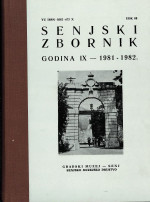GOSPODARSKI I IDEOLOŠKI PRISTUP USKOČKOM RATU I USKOČKOM MITU
ECONOMIC AND IDEOLOGICAL APPROACH TO THE USKOK WAR AND THE USKOK MYTH
Author(s): Ivan PederinSubject(s): Cultural history, Comparative history, Diplomatic history, Economic history, History of ideas, Local History / Microhistory, Social history
Published by: Senjsko muzejsko društvo i Gradski muzej Senj
Keywords: Uskoks; Uskok War; Uskok myth; August Šenoa; Silvije Strahimir Kranjčević; Bare Poparić;
Summary/Abstract: This war (in the XVIth Cent.) is now considered as the war for the free trade in the Adriatic and for the free trade with Bosnian raw materials towards Italy. The new situation leading to the increase of trade is also considered. The Ottoman empire ceases to be a military threat to the West. As the war for the Turks is not a source of gain any more the exploitation of the peasant increases and the Empire is obliged to export more goods. So the Ottoman Empire becomes a trade partner for the West.The western state stops to be a corporational state and becames absolutistic, a state-entreprise. As the trade of the Balkans goes though the Adriatic ports the Uskok war starts.For the Uskoks this corsair-war was the war for the trade and is compared to the corsair war between, Spain, France, England and the Netherlands for the America trade in the XVIth to the XVIIIth Cent. For Austria this was the war for the free trade from Rijeka and Triest towards Loreto and Bari. Venice fought for the control of the Adriatic and the compulsorly passing of every ship though the port of Venice where a tribute was to be paid. Venice won the war defeating the Archduke Ferdinand in Istria and obliging him to withdraw the Uskoks from Senj.This war was not a religious war any more, Venice fought with the Turks and with the aide of James I. of England. Austria with Spain. In the peace treatise the problems of the territorial sea was discussed, this same problem who was discussed in Den Haag in 1930.In the final part the Uskok myth was evaluated. It was created by August Šenoa in 1975. as a Croat national, liberal and military myth, which influenced greatly our spiritual life and particularly the poetry of Kranjčević. The circumstances and reasons for the creation of such a myth were considered, it were the peasant uprising in Bosnia in 1875. Bare Poparić modernized in 1936. this myth adding the element of guerilla and the sea to Senoa's image of the uskoks who are mainly citizen. For Bare Poparić they are guerillas who first became aware of the importance of the sea for Croatia.
Journal: Senjski zbornik - prilozi za geografiju, etnologiju, gospodarstvo, povijest i kulturu
- Issue Year: 9/1982
- Issue No: 1
- Page Range: 183-202
- Page Count: 10
- Language: Croatian

